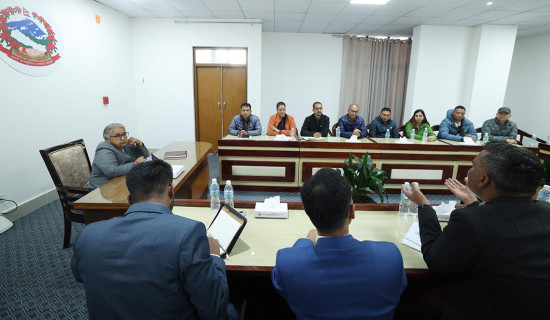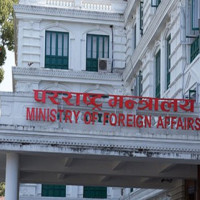- Monday, 1 December 2025
A War That Questions Humanity
The exchange of Israeli and Palestinian hostages captured by each other was long-awaited not only by the families of the hostages but also by millions of people around the world. In Nepal, too, Bipin Joshi’s release was awaited not only by his family but by the entire nation. Hamas took him hostage during his learn-and-earn programme in Israel. Unfortunately, when on Monday, 13 October 2025, everyone was awaiting the safe return of their loved ones, Bipin Joshi was not among the 20 live hostages returned by Hamas to Israel. There were also the bodies of four deceased hostages. In exchange for these 24 hostages taken by Hamas, Israel released about 2,000 Palestinians.
The release of hostages as the first step of the ceasefire was a scene many will not forget, whether they were there physically or watched virtually: the return of living hostages and the bodies of those who had died. The joy of seeing live hostages return, the pain of losing the deceased, and the relief of bringing closure to the lives of beloved family members and friends — these are feelings difficult to understand until one faces them personally. However, the shared grief for Palestinians, Israelis and several other nationals during the Israel–Palestine war has been felt globally. Nepalis, too, share the grief of Bipin Joshi’s family.
Israel offensive
The current Israel–Palestine war goes back to 7 October 2023, when Israel launched its offensive in response to the Hamas-led attack on southern Israel. This resulted in the killing of 1,200 people and 251 taken hostage in Gaza. Since then, 67,000 people have been killed by Israel’s offensive, according to Gaza’s Hamas-run health ministry. The UN and other international bodies recognise this number as reliable. During this war — ignited by the Hamas-led attack on Israel and the subsequent retaliation by Israel — several innocent people have lost their lives, and the existence of people in Palestine has become a nightmare that the world watched virtually as bombs destroyed cities and took away lives and dreams.
The feeling that Palestinians were being wiped away seemed to grow day after day. Similar history, like the Holocaust of the Jews during World War II, was being witnessed by global citizens via virtual media, although in a different context. Inhuman scenes of people, especially children, scavenging for food and necessities have been common during these past two years, leading to questions about how some people on earth have the power to destroy the lives of others to the extent that they could wipe out a nation and its people.
Finally, President Donald Trump’s administration, with support from leaders in the region and global leaders, has been able to enforce a ceasefire, which should have been done a long time ago but was not possible because of the stance taken by Israeli Prime Minister Netanyahu, who refused to stop bombing Gaza. Hamas is indeed a militant terrorist group that does not deserve support from anyone. However, in the guise of wiping them off, moving towards wiping off an entire nation is a heinous act that Netanyahu will be questioned about again and again, especially by generations that follow.
History has captured this act of horror and it will be remembered as a dark phase of human civilisation. No matter how advanced human civilisation is said to be, acts like this war in the Middle East question the intentions of immediate actors like Israel and Hamas and also point fingers at the suppliers of weapons, including powerful nations like Germany, the USA and others. There is an understanding that weapons, both nuclear and conventional, are created to defend people and protect humankind. However, it is ironic that most of the time they are, in fact, used to destroy lives and assets that have taken years to accumulate. They also destroy nature and the climate and have often left Mother Earth bleeding.
The scenes of famine and the sight of little hands asking for food, shown virtually from Gaza, trouble me here in Nepal. Hearts from all over the world go out to these children and adults who, through no fault of their own, have borne the brunt of the wrath of leaders like Netanyahu, who feel that the power they possess — and the resources their nations have or can garner from other powerful countries — allow them to attack Gaza as they have. The Gaza Strip has already been declared to be in a state of famine. Rebuilding Gaza is now a daunting task that must be undertaken with care, including material and humanitarian support.
Malnutrition
People whose families and resources have been wiped out, and who themselves have been pushed to the brink of death due to famine, need to be supported with care — not only to save their lives but to help them recover mentally so they do not resort to revengeful acts. A World Bank chief economist for the Middle East, North Africa, Afghanistan and Pakistan region, poverty in Gaza could persist for several generations due to child malnutrition and the mental-health crisis caused by this two-year war.
According to the Integrated Food Security Classification, about 132,000 children under the age of five are expected to suffer from acute malnutrition by June 2026. The impact of malnutrition, particularly during the formative years, is expected to have repercussions throughout their lifetimes. The current war in Gaza needs to be seen as a phenomenon that should never have happened. The only way to prevent this is to have a mechanism for controlling weapons of mass destruction and to prevent them from being made available to countries that may not only kill those they see as enemies but also attempt to wipe out a whole nation and its citizens.
(Sharma is a senior journalist and women rights advocate namrata1964@yahoo.com X handle: @NamrataSharmaP)

















